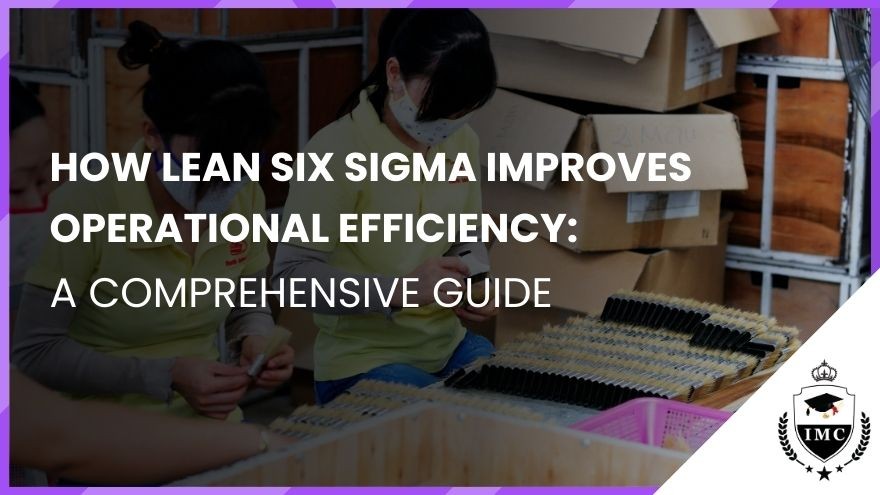Operational efficiency is more critical than ever. Organizations are constantly seeking ways to optimize processes, reduce waste, and improve quality to stay ahead of the competition. Lean Six Sigma has emerged as one of the most effective methodologies to achieve these goals. By combining Lean principles, which focus on waste elimination, and Six Sigma, which emphasizes quality improvement, businesses can unlock a powerful strategy for operational excellence.
At IMC Institute, we offer comprehensive Lean Six Sigma certifications (Yellow, Green, Black, and Master Black Belt) designed to help professionals master these methodologies. Additionally, we provide PMP certification accredited by PMI, and for those seeking to boost their career with both certifications, we are offering a 50% discount on the combo of Lean Six Sigma and PMP certifications.
In this blog, we will explore how Lean Six Sigma improves operational efficiency, featuring real-world examples of its success across various industries.
What Is Lean Six Sigma?
Lean Six Sigma is a hybrid of two powerful methodologies:
- Lean: Focuses on eliminating waste in processes, aiming for maximum efficiency and value creation.
- Six Sigma: Aims to reduce defects and variations in processes, ensuring consistent quality and performance.
Together, Lean Six Sigma helps organizations streamline their operations, minimize costs, and enhance customer satisfaction.
Key Ways Lean Six Sigma Improves Operational Efficiency
1. Reducing Process Waste
One of the core principles of Lean Six Sigma is the reduction of waste, defined as any activity that does not add value to the customer. This waste can come in many forms, such as overproduction, unnecessary movement, defects, and excess inventory.
Real-World Example: Toyota Toyota is a classic example of how Lean Six Sigma can dramatically improve operational efficiency. The company's "Toyota Production System" is grounded in Lean principles. By continuously identifying and eliminating waste, Toyota has significantly reduced production costs, minimized inventory, and shortened lead times, all while maintaining exceptional quality standards.
2. Improving Process Flow
Lean Six Sigma emphasizes smooth, uninterrupted workflows. It helps companies identify bottlenecks and inefficiencies in their processes, allowing them to redesign workflows for maximum efficiency.
Real-World Example: Motorola Motorola, the originator of Six Sigma, utilized the methodology to improve process flows in its manufacturing operations. By identifying inefficiencies and making data-driven improvements, Motorola was able to cut production costs by over $2 billion in just a few years. The company’s success with Six Sigma helped it set a new standard for operational efficiency in manufacturing.
3. Data-Driven Decision Making
One of the strengths of Lean Six Sigma is its reliance on data and statistics to drive decision-making. By collecting and analyzing process data, organizations can make informed choices that lead to more efficient operations and fewer errors.
Real-World Example: General Electric (GE) When General Electric implemented Six Sigma in the 1990s, it became one of the most famous case studies of Lean Six Sigma's success. GE applied Six Sigma tools across various departments, using data to guide process improvements. This approach resulted in over $12 billion in savings over five years, primarily due to increased operational efficiency and reduced defects.
4. Enhanced Quality Control
Six Sigma's focus on minimizing defects ensures that products or services are of the highest possible quality. By improving quality control, companies can reduce rework, save time, and cut costs, contributing to overall operational efficiency.
Real-World Example: Amazon Amazon implemented Lean Six Sigma to improve its warehouse operations and customer fulfillment processes. By optimizing quality control measures, Amazon was able to reduce shipping errors, streamline its logistics, and significantly enhance customer satisfaction, contributing to its rapid growth and market dominance.
5. Sustainability and Long-Term Efficiency
Lean Six Sigma isn’t just about short-term fixes; it’s designed to foster a culture of continuous improvement. Once implemented, the principles of Lean Six Sigma help organizations sustain operational efficiency over the long term by promoting ongoing evaluation and refinement of processes.
Real-World Example: Dell Dell applied Lean Six Sigma to improve its supply chain management and manufacturing processes. By creating a culture of continuous improvement, Dell has managed to reduce cycle times, minimize costs, and sustain a high level of operational efficiency over the years. This has enabled Dell to keep pace with technological advancements while delivering products quickly and efficiently.
Lean Six Sigma Certifications at IMC Institute
If you're looking to enhance your skills in improving operational efficiency through Lean Six Sigma, IMC Institute offers certifications across all belt levels:
- Yellow Belt: For beginners, focusing on the basics of Lean Six Sigma.
- Green Belt: Intermediate level, suitable for professionals looking to lead small process improvement projects.
- Black Belt: Advanced level, designed for those who want to lead complex projects and mentor others.
- Master Black Belt: The highest level, for experts who want to drive organizational change and strategy using Lean Six Sigma principles.
In addition to these certifications, we also offer PMP certification accredited by PMI, which focuses on the essentials of project management.
Special Offer: 50% Discount for Lean Six Sigma and PMP Certification Combo
At IMC Institute, we recognize the value of combining Lean Six Sigma and PMP certifications. That’s why we are offering a 50% discount for professionals who enroll in both certifications together. This combo equips you with the skills to not only improve operational efficiency but also to manage and lead projects effectively.
Summary: Lean Six Sigma as a Key to Operational Success
Lean Six Sigma has proven time and again to be a powerful tool for improving operational efficiency in organizations of all sizes and across industries. Whether you’re in manufacturing, healthcare, IT, logistics, or any other field, the methodology can help you eliminate waste, improve process flow, enhance quality, and achieve sustainable efficiency.
At IMC Institute, we are committed to providing high-quality training in Lean Six Sigma and PMP certifications, giving you the knowledge and skills to excel in today’s competitive business environment. With our special combo offer, now is the perfect time to elevate your career and make a lasting impact in your organization.






